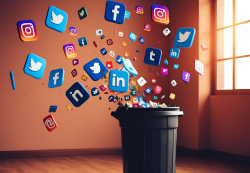Bezos Says What Won't Change Matters More Than What Will Change

Ask Yourself What Won't Change to Build a Lasting Business
This conversation with Jeff Bezos a number of years ago is more relevant now than ever. Regardless of how you feel about Bezos, it's hard to ignore how Amazon has changed consumer buying behavior and shaped the ecommerce landscape.
"It's interesting, I do get asked quite frequently what's going to change in the next 10 years. One thing I rarely get asked is probably even more important — and I encourage you to think about this — is the question: What's not going to change in the next 10 years.
The answer to that question can allow you to organize your activities. You can work on those things with the confidence to know that all the energy you put into them today is still going to be paying you dividends 10 years from now," he said.
"It's impossible to imagine people saying to me, 'Jeff, I love Amazon. I just wish you delivered a little more slowly. Or I love Amazon, I just wish your prices were a little higher." The focus becomes, "What can we do to offer lower prices? To deliver faster? and so on," Bezos said.
In contrast, he said that when a leader bases their strategy on things that will change, like who the competitors are and what their tactics are, "You are going to have to be changing your strategy all the time."
When you know what won't change, "You won't have to do a lot of research on that. As soon as you think about it that way, these things are so big, so fundamental; you can just write the answers down."
I found myself drawn to Bezos' what won't change in 10 years question recently. We're imagining what Quest Technology Group will look like in the next few years so flipping our thinking to what won't change has been eye-opening.
It's hard for any of us to escape the feeling that we're falling behind. It's more than just the AI goldrush. It's the speed at which all business is moving to keep up, do more, deliver faster, and be smarter than our competitors. It's an unhealthy distraction from staying true to what our customers value most from us.
So I grabbed pen and notebook and did a quick thought dump. What were we doing 10, 20, 30 years ago that has survived? Before I realized it, I had a list of 10 things that haven't changed in all these years. Let's call them Unchangeables.
What surprised me is that these aren't specific to any industry, customer, niche, service or the latest big whatever. Instead, they're the fundamental human things that sustain the company-customer relationship day in and day out.
This is just a quick, top of mind list so don't judge. I'm sure it's lacking, and you have many to add. Let's run with these for now.
Confidence. Our customers want to feel in control of the decisions that impact their business. They want to be a participant not a passive observer.
Knowledge. The more information we freely share the more confident our customers become. Knowledge-hoarding is a out-of-date tactic. (That's one thing that has changed for the better.)
Trust. There is mutual respect shown by listening more and talking less.
Respect. Expertise exists on both sides of the relationship, and neither one has all the right answers.
Right fit. Our customers feel heard and understood. They know it's happening when their needs form the basis for the unique services we provide to them.
Transparency. Pricing is freely disclosed without making the customer work for it.
Freedom. Contractual commitments are crafted to serve both the customer and the company. Either party should be able to end the relationship at any time with reasonable considerations such as outstanding payments due.
Value. The price they gladly pay is equal to or greater than the measurable value they receive.
Truthfulness. The products and services they purchase live up to the sales promises made.
Human design. Attention to customer experience is baked into every deliverable.
How to Build on the Unchangeables and Worry Less About What's New
How are losing sight of these Unchangeables? What would it mean to our business and our customers if these were our focus instead of getting sucked into the what-are-we-missing-out-on-today frenzy? Again, these are the first thoughts that came to my mind, and these questions deserves a lot more discussion than this short post.
Social media made us the product. We've willingly given up our privacy, identity, knowledge, and humanity in exchange for always-on mindless distractions. These are snapshots without context and opinions lacking credibility. Consume less and think more.
SaaS products have commoditized service. We've become a one-size-fits-all audience for mediocre, half-baked products that underserve our everyday business needs. Start with the long view and then acquire tools with purpose. Review often and replace as needed.
Many technology providers have adopted the return on investment dollars and fast acquisition business model. Customers are financial metrics, not valued relationships. Consider how a change in the company's direction would impact your business.
Human expertise that considers customer needs before selling and solving has been outsourced to efficient technology. If there is one thing that we can all do right now to become the business partner our customers deserve, it's to bring humanness back to our relationships.
Discover Practical Knowledge Sharing for Business & Technology Leaders
If you've ever searched for a place to connect with business leaders without the ads, sales pitches, and usual social media clutter, you know how hard that can be.

That's why we created Studio CXO. We're business leaders like you who know there can be a better way.
Explore Studio CXO Now
 Linda Rolf is a lifelong curious learner who believes a knowledge-first approach builds valuable, lasting client relationships.
Linda Rolf is a lifelong curious learner who believes a knowledge-first approach builds valuable, lasting client relationships. She loves discovering the unexpected connections among technology, data, information, people and process. For more than four decades, Linda and Quest Technology Group have been their clients' trusted advisor and strategic partner.
Tags: Business Strategy

